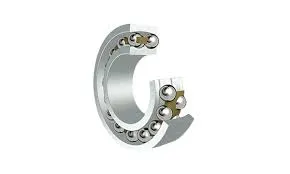
Nov . 27, 2024 17:10 Back to list
Advantages of Carbon Steel Bearings in Industrial Applications and Their Performance Benefits
Carbon Steel Bearings An Overview
Bearings are crucial components in various mechanical systems, serving to reduce friction between moving parts and providing support for rotating or oscillating components. Among the diverse materials used in bearing production, carbon steel remains one of the most widely employed options due to its advantageous properties, cost-effectiveness, and versatility. This article explores carbon steel bearings, their characteristics, applications, and the factors to consider when selecting them for specific uses.
What is Carbon Steel?
Carbon steel is an alloy primarily composed of iron and carbon, with the carbon content typically ranging from 0.05% to 2.0%. The properties of carbon steel can be significantly altered by adjusting the carbon content and introducing other alloying elements. It can be classified into three categories based on the carbon percentage low carbon steel, medium carbon steel, and high carbon steel. For bearings, medium to high carbon steels are often preferred due to their improved hardness and wear resistance properties.
Characteristics of Carbon Steel Bearings
1. Strength and Durability Carbon steel bearings are known for their high strength and wear resistance, which allows them to withstand significant loads and prolonged use. The hardness of carbon steel can be enhanced through heat treatment, which increases its resistance to deformation and wear.
2. Cost-Effectiveness Compared to other materials like stainless steel, ceramics, or specialized alloys, carbon steel is relatively inexpensive. This attribute makes carbon steel bearings a popular choice for applications where cost is a significant concern without sacrificing performance.
3. Resistance to Fatigue Carbon steel bearings exhibit excellent fatigue resistance, allowing them to endure repeated stress cycles without failure. This characteristic is particularly critical in applications involving rotational motion.
4. Temperature Resistance While not as heat-resistant as some advanced materials, carbon steel can perform adequately in moderate temperature environments. However, extreme conditions may lead to deterioration, necessitating careful selection based on operational environments.
5. Corrosion Resistance One of the major drawbacks of carbon steel is its susceptibility to rust and corrosion. To mitigate this issue, carbon steel bearings can be coated or treated with various methods, such as phosphating or applying protective greases, to enhance their longevity in humid or corrosive environments.
Applications of Carbon Steel Bearings
Carbon steel bearings find applications in numerous industries, capitalizing on their robust properties. Common applications include
- Industrial Machinery Used in conveyor systems, pumps, gearboxes, and motors, carbon steel bearings support various types of machinery by ensuring smooth operation and efficiency.
carbon steel bearings

- Automotive Components In vehicles, carbon steel bearings are utilized in wheel hubs, engine components, and transmission systems, where reliable and durable functionality is paramount
.- Construction Equipment Heavy machinery such as excavators, bulldozers, and cranes depend on carbon steel bearings for their reliable performance under substantial loads.
- Household Appliances Common appliances, such as washing machines and electric fans, often utilize carbon steel bearings for their cost-effectiveness and reliability.
Selecting Carbon Steel Bearings
When selecting carbon steel bearings for a particular application, several factors should be considered
1. Load Requirements Determine the static and dynamic loads the bearings will face during operation. This includes assessing both radial and axial loads.
2. Speed Rating The operational speed of the application should align with the bearing's design. High-speed applications may require specialized bearings with enhanced properties.
3. Environmental Considerations Assess exposure to moisture, heat, or chemicals that may affect the bearing's performance. Coating or sealing solutions may be required to improve corrosion resistance.
4. Service Life Evaluate the desired longevity of the bearings. This will help in determining whether regular lubrication and maintenance are necessary or if a more robust solution is warranted.
5. Cost Constraints While carbon steel bearings are relatively inexpensive, balancing cost with performance requirements is essential for optimal selections.
Conclusion
Carbon steel bearings are integral components in countless mechanical systems, offering a blend of strength, durability, and cost-effectiveness. While they come with some limitations, particularly concerning corrosion resistance, their advantages make them ideal for a wide range of applications. Understanding their characteristics and proper selection criteria can facilitate effective use and ensure operational efficiency across various industries. As technology advances, innovations in materials and coatings may further enhance the capabilities and lifespan of carbon steel bearings, solidifying their role in modern engineering solutions.
Latest news
-
Premium Deep Groove Ball Bearings | High Speed & Reliability
NewsAug.29,2025
-
Durable Scaffolding Clamps - Secure & Reliable Tube Connectors
NewsAug.28,2025
-
Common Failures in Thrust Ball Bearings and Solutions
NewsAug.22,2025
-
How Tapered Roller Bearings Can Take Shock Loads
NewsAug.22,2025
-
Angular Bearings in High-Precision Spindles
NewsAug.22,2025
-
The Impact of Misalignment on Cylindrical Roller Bearing Performance
NewsAug.22,2025
